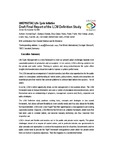Draft final report of the LCM definition study

View/
Date
2003Author
Saur, Konrad
Donato, Gianluca
Flores, Elisa Cobas
Frankl, Paolo
Jensen, Allan Astrup
Kituyi, Evans
Lee, Kun Mo
Swarr, Tom
Tawfic, Mohammed
Tukker, Arnold
Language
enMetadata
Show full item recordAbstract
Life Cycle Management is a new framework to meet our present global challenges towards more
sustainable patterns of production and consumption. In this context, LCM is offering a platform for
the private and public sector. Thinking in systems and along product/service life cycles offers
insights into how decisions should be made to improve a systems performance.
The LCM concept has emerged out of industrial practice, but offers also opportunities for the public
sector. In a new global understanding all market actors, policy makers, industry and consumers are
essential players that need to find common platforms to achieve triple bottom line success - for all
actors.
In so far, LCM is rather opportunity driven as risk management or risk aversion driven. The LCM
framework build on factual information and uses a variety of procedural and analytical tools, which
themselves serve as underpinning of programs, management systems and, finally, corporate and
policy strategies.
The LCM Definition study positions existing tools, concepts and strategies in one overall
framework, that allows sufficient flexibility to meet specific needs and thus also allows for flexibility
for implementation. LCM is not a new “super”-tool that superimposes a new approach over existing
successful practice. Opposite, LCM offers for the first time an umbrella framework, where tools that
had been used in isolation before, can become mutually reinforcing and thus maximize their
respective use.
LCM is broad and flexible and reaches out to the public and private sector equally. The global
challenges ahead of us require all market actors, and in particular industry and governments to
align concepts and approaches to achieve the respective aims for all parties. Governments and the
public sector need to provide the “right” framework and guidance under which the private sector
then can realize its business objectives. Then this happens in a coordinated fashion.
